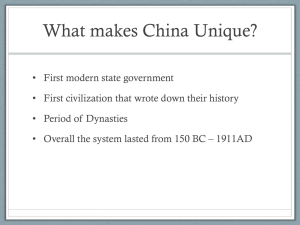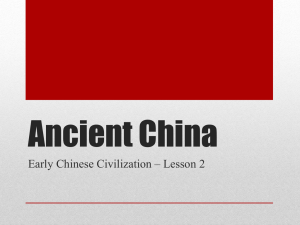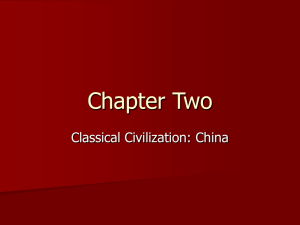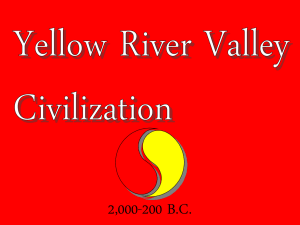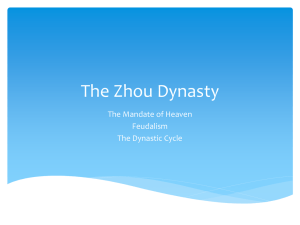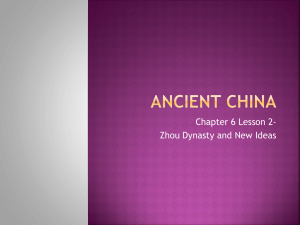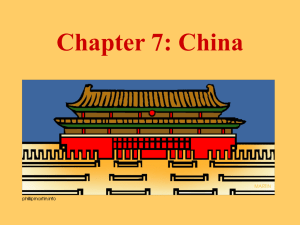Xia, Shang, Zhou Dynasties
advertisement
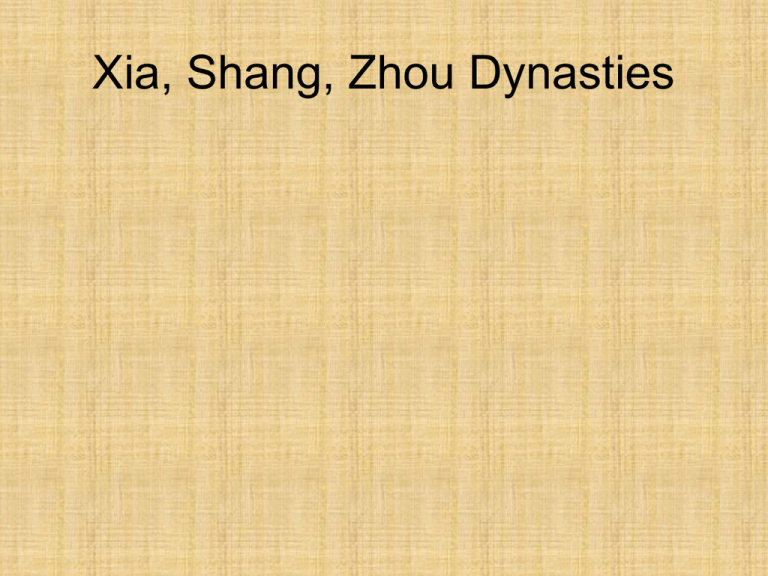
Xia, Shang, Zhou Dynasties Xia Dynasty • 2100 BC (est.) – 1600 BC (est.) Xia Dynasty Xia Dynasty Xia Dynasty Yu the Great: • Founder of Xia Dynasty Xia Dynasty • recruited Yu as successor to his father's floodcontrol efforts--began to dredge new river channels • thirteen years at the task, with the help of some 20,000 workers. • "Passing his own door three times“--tale of Yu's dedication Xia Dynasty • had been married only five days • first time he passed by hearing that his wife was in labor • second time, his wife was holding his son's hand as he was learning his first steps • third time, his son greeted him and enjoined him to come in for rest Xia Dynasty • Yu is remembered: 1. example of perseverance and determination 2. revered as the perfect civil servant. Xia Dynasty 1. 禹 2. 啟 3. 太康 4. 仲康 5. 相 6. 少康 7. 杼 8. 槐 17. 桀 Yǔ (Yu the Great) Qǐ Tai Kang Zhòng Kāng Xiāng Shào Kāng Zhù Huái Jié Creation of the First Dynasty Xia Dynasty Xia Dynasty Xia Dynasty • Remain a mythical dynasty—no written records to prove history Shang Dynasty • 1600 BC – 1046 BC Shang Dynasty Shang Dynasty Shang Dynasty • Society Structure: king - priest upper class – priests and nobles lower class – everyone else farmers, artisans slaves Shang Dynasty 1. 湯 (成唐) 2. 太丁 3. 外丙 4. 仲壬 5. 太甲 6. 沃丁 20. 盤庚 31. 帝辛 Tāng a Sage king; overthrew tyrant Jié Tài Dīng Wài Bǐng Zhòng Rén Tài Jiǎ Wò Dǐng Pán Gēng golden age of the Shāng dynasty. Oracle bone inscription Dì Xīn Shang Dynasty • Warfare: large armies, bronze weapons, collect tribute Shang Dynasty Writing: • inscriptions on bronze or dragon bones • shamans communicated with ancestors • animal spirits were the messengers Shang Dynasty Shang Dynasty Shang Dynasty Shang Dynasty Bronze metal working: • used to legitimize dynasty • metal ore, wood fuel, human labor • key ritual role in maintaining Shang status Shang Dynasty Shang Dynasty Shang Dynasty bronze covered container Shang Dynasty bronze ding vessel Shang Dynasty bronze wine vessel Zhou Dynasty • 1045 BC – 256 BC Zhou Dynasty Zhou Dynasty Zhou Dynasty • Tribute people in western part of Shang Kingdom • Rebelled against tribute payments • 50,000 vs 700,000 Zhou Dynasty King Wen Wang • founder of the Zhou Dynasty Zhou Dynasty Duke of Zhou • Brother of King Wu Zhou Dynasty 1. Zhou family Dynasty 2. Western Zhou 3. Eastern Zhou: – Spring and Autumn Period – Warring States Period Zhou Dynasty • Feudalism: Zhou Dynasty • Ruler is the “Son of Heaven” with the Mandate of Heaven Zhou Dynasty Chinese philosophers: • • • • Kong Fuzi (Confucius), founder of Confucianism Laozi, founder of Daoism Mozi (Micius), founder of Mohism Mengzi (Mencius), a famous Confucian who expanded upon Kong Fuzi's teachings Zhou Dynasty • Shang Yang and Han Feizi, responsible for the development of ancient Chinese Legalism • Xunzi, who was arguably the center of ancient Chinese intellectual life during his time Zhou Dynasty 100 Schools of Thought: • private schools established during the Spring/Autumn Period as well as Warring States period (around 500 BC till 220 BC) • school was led by a teacher or a philosopher who represented the particular thoughts • 20 different streams of thought Zhou Dynasty • Golden Age of Chinese philosophy • different schools debated the best ways to resolve the violence of the period Zhou Dynasty 100 Schools of Thought: • Confucian School (孔家) • "Taoism" or "Daoism" School (道家) • Mohism School (墨家) • Legalism School (法家) • Yin Yang School (阴阳) • School of Agriculture (农家) • Dialecticians School (名家) • Military School (兵家) 100 Schools of Thought Confucian School (孔家) • focused on teaching of ethics such "Li, Yue, Ren, Yi" (礼乐仁义) or "Ritual, Benevolence and Righteous" as a way of creating a good society • ruler must be benevolent and use morality when ruling his kingdom 100 Schools of Thought Confucian School (孔家) • relationship of respect between the ruler and subject in the so-called "Jun Jun Chen Chen" (君 君臣臣) and filial piety in the family • Han Dynasty Confucianism became the state philosophy. 100 Schools of Thought "Taoism" or "Daoism" School (道家) • stresses "Dao" (道) or "way" in universe 1. guiding principle that controls every aspect of the universe 2. not an unseen spiritual thing that people can recognize 100 Schools of Thought "Taoism" or "Daoism" School (道家) • stressed "Wuwei"(无为) (i.e. do nothing), listen to nature, 'give up on benevolence and righteousness‘ • let nature take its course • later became a religious sect 100 Schools of Thought Legalism School (法家): • stressed the use of law (i.e. legalism) and reform to create a powerful state • reform a state in areas of politics, economy and society • transform the state from slavery society to a feudalist society • Han Fei Zi (韩非子), Li Si (李斯). 100 Schools of Thought Mohism School (墨家): • opposed the teaching of Confucianism • used natural science to support its teaching 100 Schools of Thought • Yin Yang School (阴阳): • stressed dualism "Yin Yang" (two opposing forces "Yin" and "Yang") • five elements (Gold, wood, Water, Fire, Earth) • used to explain natural phenomenon, society and dynasty change 100 Schools of Thought School of Agriculture (农家): • taught farmers the farming method and agriculture production • importance of ruler putting emphasis on agriculture as the basis for development • gathered past farming methods and experiences • researched new methods of increasing productivity 100 Schools of Thought Dialecticians School (名家): • focus on study of logic, meaning of words, concepts, arguments and Zhou Dynasty Zhou technology achievements: 1. perfection of bronze casting 2. gold and silver inlays in metal and wooden/lacquered objects 3. begin of iron casting technology and widespread use of iron tools during Warring States Period 4. development of warfare technology like iron weapons, armament, chariots and fortifications Zhou Dynasty 5. engineering technology for irrigation, drainage, waterways, canals, dikes, dams 6. development of music temperation by pipes and bells 7. dyeing of yarns and woven materials like silk and linen 8. glass production 9. multi-color lacquering of wooden or bamboo objects Zhou Dynasty Zhou science achievements: 1. perfection of the calendar 2. regular observation of the sky, recording of irregular astronomical events 3. maps of the sky; first geographical maps 4. division of China into the Nine Provinces Zhou Dynasty 5. 6. 7. 8. discovery of magnetism description of basic arithmetic and fractions calculating with chips or tallies geometry and trigonometry Zhou Dynasty


